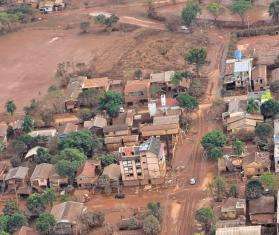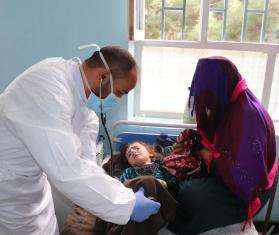"Impatience is the most important thing"
Frank Smithuis, MD, is the country manager and medical coordinator for Doctors Without Borders/Médecins Sans Frontières (MSF) in Myanmar, the country formerly known as Burma. He highlights how MSF teams are working in this isolated country to provide urgently needed care to fight HIV/AIDS, malaria, and tuberculosis.
|

|
Why is MSF in Myanmar?
MSF wants to work for the most vulnerable, disadvantaged groups in a country. This is why we are working with people in Rakhine State, particularly the Rakhine Muslims who are in a very difficult situation. They don't have citizenship, so they are not free to travel. They have less access to health services than people do in other areas in the country. The project there is mainly for malaria - we treat more than 100,000 malaria cases per year. But recently we have also started some clinics for patients with sexually transmitted diseases and for people with HIV/AIDS.
How high is the HIV rate in this country?
Actually, we don't know because there are no good statistics about HIV prevalence here. The government has done some surveillance in about 30 towns. They have some data from population groups like pregnant women, military recruits, and also sex workers and drug users. From that you can calculate some rates. The authorities have always said that it is around 20,000 to 25,000 cases in the country. Recently they have increased the estimate to 180,000. I am afraid it is much higher.
What is the general health situation like?
Health services are seriously under funded. The budget is less than $5 million for 50 million people. The international donor community does not want to give funding for the health system in Myanmar for political reasons. The West clearly does not favor the current government and has therefore decided not to give substantial foreign aid to the country.
Does MSF have a problem getting enough money for the projects?
Not really. That is the great advantage of being financially independent. Now the donor community is - after 10 years of ignoring the HIV epidemic - giving more because its members realize that HIV in Myanmar is a serious problem and that they have to do something - that you cannot wait for your political agenda to be fulfilled. Whichever government is in charge of this country, HIV will be a serious problem.
Besides HIV, what are the other main health problems?
Linked to HIV is tuberculosis (TB), a common co-infection. Sexually transmitted diseases (STDs) also help facilitate the spread of HIV. Another problem is malaria. We started malaria programs in the country about nine years ago. MSF has done quite some research on it. We studied the anti-malarial drugs chloroquine and fansidar, which were being used, and found very high rates of resistance - 65 to 85 percent. UNICEF and WHO were using or supplying these drugs and continued to supply these drugs even after we gave them the study results. After the study, we suggested changing the protocol to artesiminin-mefloquine, which is highly effective. We were allowed to do so after some hesitation on the part of the authorities. Several years later, the government changed its protocol as well.
What are your biggest successes?
I think there are several successes, like the malaria program. In the country we treat probably 150,000 malaria patients per year, 100,000 of them in Rakhine state. I think that is significant. We give treatment that is about 95 percent to 100 percent successful. We have done research that has contributed to the change of the national policy, and we are still doing research for cheaper medicines with fewer side effects.
The second success is more difficult to measure. It is the treatment of STDs and HIV/AIDS. In the beginning, these topics were very taboo. It was very difficult to work with high-risk groups. It was hard to get treatment for people living with HIV/AIDS. That has changed. While it is not perfect, we have set up health services for sex workers. In some areas we have seen a serious decrease in gonorrhea. In a jade mine area where we have several clinics, the amount of gonorrhea has decreased so much that when I wanted to do a study about drug sensitivity, I could not find enough patients. I like to believe that the thousands of patients we have treated for STDs and the hundreds of thousands of condoms we have distributed, have contributed to this.
We started home-based care for the severely ill who cannot come to the clinic. In the beginning I was very worried about how to keep people's disease status confidential. Well, I can assure you that you can't keep AIDS confidential in a home-based care program. Everybody knows within a minute that the person has AIDS and that you come to visit because he has AIDS. But because we shake the patient's hand, we do a physical exam, we touch him, we listen with the stethoscope, we look in his throat, the program actually made the people in the house and in the surrounding houses less fearful of people with AIDS. We also started an ARV treatment program with the government, which I believe has sped up ARV treatment in Myanmar.
So you mean the government will provide ARV treatment?
Yes, because recently the Global Fund agreed to give money for HIV/AIDS in Myanmar, so if that money comes through then the government will use some of that money for ARV treatment.
What are the next challenges?
To speed things up. Every country has to go through a process. First, you ignore that you have a problem. Then you come up with some ineffective or even counter-productive solutions, like putting all the sick on an island or wanting to test everybody by force or arresting all the sex workers, etc. But finally there comes a realization that this doesn't work. That you have to start prevention programs like offering condoms and providing sexual health services to sex workers instead of arresting and repressing them. That you should promote voluntary testing instead of forced testing and should start caring for and treating people with AIDS instead of isolating and discriminating against them. Sometimes this process is terribly slow and can cost hundreds of thousands of people their lives.
So patience is the most important thing here?
No, impatience is the most important thing - to keep things and people moving.




